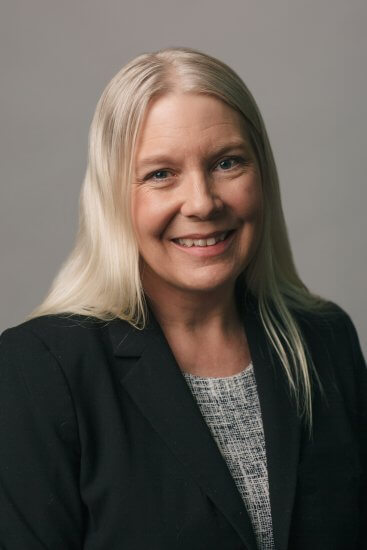From the back of the class to the head of the faculty
The new dean of the Faculty of Science and Technology (FST) at Athabasca University (AU) plans to raise the profile of the faculty’s programs and to empower the people within it.

Dr. Shauna Zenteno, who was appointed to the role earlier this year, said she’s honoured to lead such a talented group of faculty and learners, and hopes to leverage the great work that’s already been done.
“What I really want for FST is to create opportunities for us to continue to increase our reach, increase our relevance, and increase our ability to make a true difference in our learners’ lives and the lives of the communities in which they’re embedded,” she said. “I want us to really push the envelope in terms of global education and what is possible.”
She pointed to the innovative approaches to distance and online education that are already in place within the faculty.
Take-home lab kits, for example, allow undergraduate students to get hands-on experience in the comfort of their own home. Open educational resources like the award-winning open textbook for organic chemistry allow students to engage with course material in a way that’s not possible in traditional classrooms. And new technologies like learning analytics, machine learning, and computational approaches to science within the School of Computing and Information Systems are changing what is possible with online learning.
“Our role as online educators, we have a unique position at AU in being able to deliver that hands-on practicality in science as well as theory,” Zenteno said. “And we really are a leader in that.”
“I want us to really push the envelope in terms of global education and what is possible.”
– Dr. Shauna Zenteno, Dean, Faculty of Science and Technology
Inspirations and cautionary tales
Zenteno said she knew from an early age she was interested in science.
While that interest came in part from a biography of Marie Curie she had as a kid—one she read over and over and over again—it was also driven by a natural desire to learn more about the world around her.
“I think I’ve always had a curiosity,” she said. “Being a really curious and driven person, I’ve always had an interest in science and biology from a young age.”
And while Zenteno had many mentors and inspiring teachers through the years, she said her educational philosophy has also been strongly influenced by challenges and barriers she faced in her own educational journey.
In high school, for example, one biology teacher told her that she should not sit at the back of the class, because all of this teacher’s best students sat at the front of the class.
“I didn’t like the idea that certain students had preferential treatment, or that certain students should behave a certain way,” she said. “So I set out to prove him wrong.”
Another challenge Zenteno faced was during her undergraduate degree, when one particular professor belittled her experience of her disability—she needed to write her exams in isolation because of her epilepsy. Not only did he refuse to allow her that accommodation, he belittled her experience by comparing it to his own experience of realizing he would never be able to play in the NBA.
These experiences helped inform her approach to education, and especially in inspiring her own overriding priority of being compassionate to her students. Likewise, experiences she had with professors encouraging her to engage in research while she was an undergraduate student made her realize that research was also one of her passions, and sparked the desire to pursue graduate-level work.
“I’ve also had some excellent educators who have inspired me, and I would say really inspired me to drive myself in discovery and working very hard, and communicating well,” she said. “I’ve had some great experiences that way, but I’ve had some negative experiences that have taught me what not to do.”
“I didn’t like that idea that certain students had preferential treatment, or that certain students should behave a certain way. So I set out to prove him wrong.”
– Dr. Shauna Zenteno, Dean, Faculty of Science and Technology
Transforming communities
Zenteno said one of the reasons she sees science and science education as being so important is that scientific literacy and understanding can help us to better understand what’s happening in the world around us, at a time when the challenges we face are increasingly complex.
As our world and careers become increasingly reliant on technology, it has never been more important to understand the facts that underlie major policy decisions that affect important areas like human health and the natural environment.
“I think we have a really important role, particularly now, in being able to provide critical thinking skills and really providing evidence as to what people should be listening to when they’re navigating social media and other information sources they’re exposed to.”
But while understanding the major changes happening in the world today requires an understanding of the science behind them, Zenteno also emphasized the importance of respecting Indigenous perspectives and traditional ways of knowing. The relationship between mainstream science and Indigenous cultures has not always been a positive one, so being more inclusive of those perspectives is important to better understand the world around us.
“Having that reciprocal relationship of respect and knowledge sharing is a big piece of us actually fully understanding some of these complex environmental issues,” she said. “So much knowledge is there already, and it’s a matter of understanding and respecting that knowledge. And that will be integral for us going forward as a society.”
Programs and courses within the Faculty of Science and Technology at Athabasca University cover a wide range of disciplines, from Astronomy to Architecture. Take a look at the programs and courses available, and start your educational journey today!